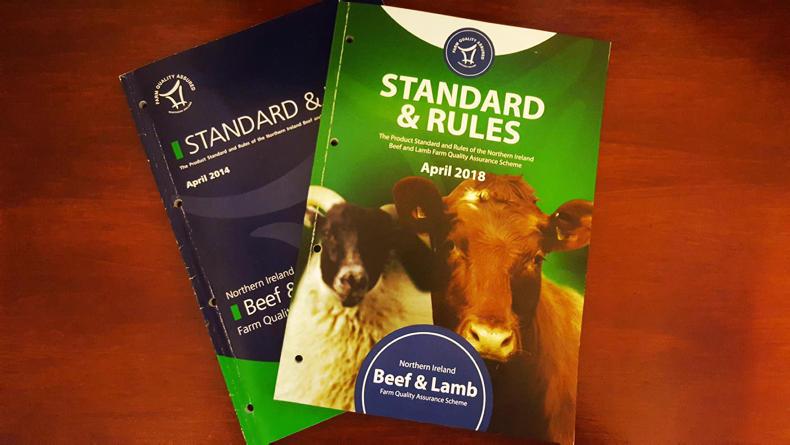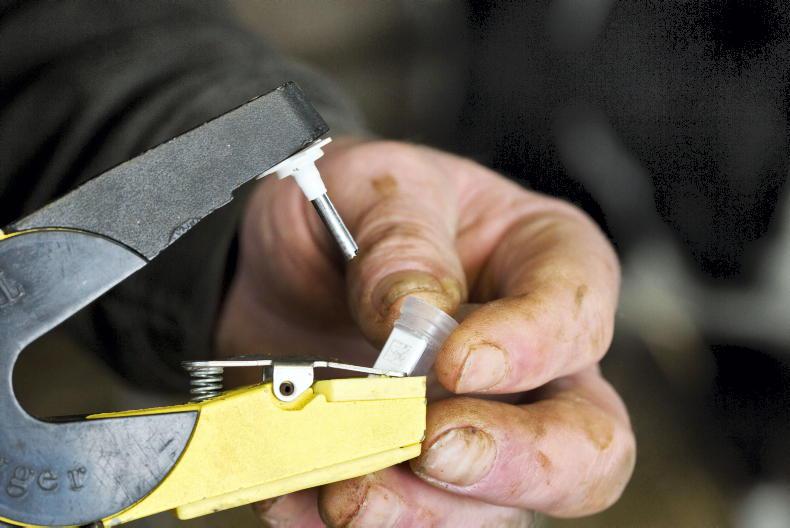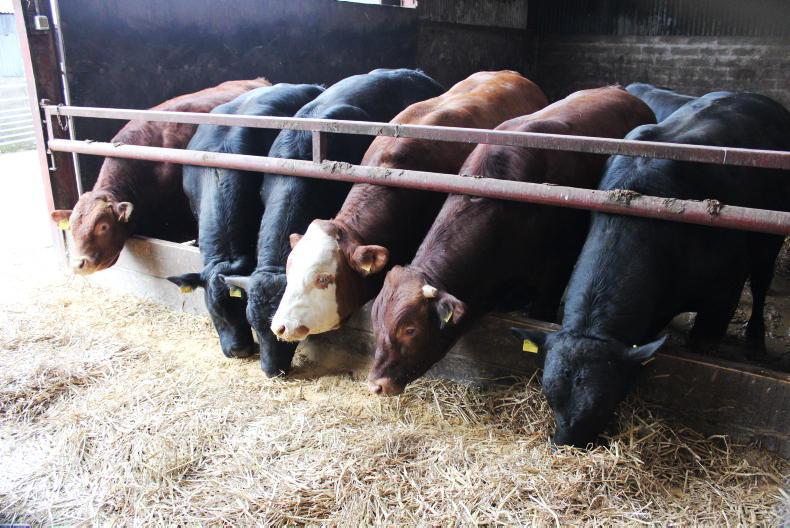The issue of lifetime farm assurance for cattle and sheep hasn’t gone away, and the latest indications are that it will be in place by October 2023, representatives from the Livestock and Meat Commission (LMC) have confirmed.
During a briefing for journalists on Tuesday, LMC industry development manager Colin Smith said it was an issue the industry will have to face in coming years, with Red Tractor Assurance, the UK’s largest food standards scheme, “very keen” to have it in place.
At present, a bovine must spend 90 days on an assured farm pre-slaughter, and a sheep 60 days, to qualify for the scheme.
Another 12,000 farms on the scheme would be a challenge for us
Around two-thirds of the cattle killed in NI would meet the lifetime requirement, but to get that figure up towards 100% would require a big increase in membership of the NI beef and lamb farm quality assurance scheme (FQAS).
At the end of December, membership stood at 12,126. However, there are around 24,000 farms in NI with cattle and sheep.
“Another 12,000 farms on the scheme would be a challenge for us, both for our budget and for the industry as a whole,” said Smith.
Currently, FQAS members pay an annual fee of £60 plus VAT. In addition, slaughter plants pay an annual fee of £400, plus a throughput fee of £1 for cattle and 10p per lamb. It is a total income of around £1.2m, which covers the cost of inspections by NI Food Chain Certification (NIFCC).
However, if membership doubled, the processor contribution to overall costs is diluted, meaning membership fees would potentially have to rise significantly to cover costs.
Target date
The time frame to introduce lifetime assurance is dependent on a number of issues, and in particular, how quickly Defra is able to move to a new electronic livestock database (similar to APHIS in NI) that can track the assured status of animals. It is due to come into operation at the end of 2020 (at the earliest).
Unannounced
The other major change that Red Tractor has introduced in recent times are unannounced inspections. But given that a high proportion of FQAS farmers are part-time, it is something that the FQAS board has pushed back on, and there are no plans to introduce it at present.
However, there are other possible changes coming, with discussions in Britain around an electronic medicine book for cattle (as exists in the Red Tractor pig scheme where producers must upload information on antibiotic use to an online site every quarter).
CAFRE courses are being rolled out at present
More immediately, from next Monday (3 February) some changes have been added to the FQAS standard which require a vet to review antibiotic use on the farm, and for someone in the farm business to undertake training in the responsible use of antimicrobials. CAFRE courses are being rolled out at present.
BVD
Also in place from 3 February is a new requirement that a FQAS member must cull calves persistently infected (PI) with BVD, in line with requirements set out by Animal Health and Welfare NI (AHWNI), or risk having their FQAS status removed.
LMC supportive of new marketing body
With an Executive restored at Stormont, there is optimism among the agri-food industry that money will finally be made available for a new NI food marketing body.
The plan put forward by the then enterprise minister Arlene Foster in 2015 was for a new structure modelled on Scotland Food and Drink, which would set the overall direction, and under which the likes of the LMC would continue to exist.
We believe there is a lot of scope for collaboration across the sectors to tell our story
To set it up, it is understood that the industry has suggested that £25m to £30m of government funding would be required over a five-year period.
“We believe there is a lot of scope for collaboration across the sectors to tell our story,” said LMC CEO Ian Stevenson.
One of the key priorities would be to create a sustainability identity for NI, similar to Bord Bia’s Origin Green approach in the Republic of Ireland.
Review of beef and sheep support
The LMC has commissioned Leicestershire-based farm consultants, Andersons, to undertake a study looking at the future for the suckler beef and sheep sector in NI, and make recommendations on how it might be supported going forward, based on experience from elsewhere.
“With Brexit, we have the chance to shape future agricultural policy, provided of course that the budget is right,” noted LMC CEO Ian Stevenson.
He added that there are other opportunities in the future, particularly in southeast Asia given the increasing demand for imported meat protein. The first UK beef (since a BSE ban was lifted) should be on Chinese plates later this year.
There is also the pressure on the UK industry from the anti-meat-eating lobby
However, he also noted that Brexit brings with it many potential challenges, whether it is doubts about the continuation of the live animal trade, or if the British market will be opened up to cheaper imports.
There is also the pressure on the UK industry from the anti-meat-eating lobby, and research which suggests that 38% of consumers are considering limiting their red meat intake in the future.
Livestock genetics database still on
the cards
A new livestock genetics database in NI, similar to the Irish Cattle Breeding Federation (ICBF) in the Republic of Ireland, was originally proposed in the Going for Growth report in 2013.
While progress has been slow, it is understood that various industry bodies might be close to agreeing on a plan.
“We would like to see some advancements in the year ahead,” noted LMC CEO Ian Stevenson.
Read more
FQAS to axe BVD non-compliant herds
LMC confirms mandatory AMR training
The issue of lifetime farm assurance for cattle and sheep hasn’t gone away, and the latest indications are that it will be in place by October 2023, representatives from the Livestock and Meat Commission (LMC) have confirmed.
During a briefing for journalists on Tuesday, LMC industry development manager Colin Smith said it was an issue the industry will have to face in coming years, with Red Tractor Assurance, the UK’s largest food standards scheme, “very keen” to have it in place.
At present, a bovine must spend 90 days on an assured farm pre-slaughter, and a sheep 60 days, to qualify for the scheme.
Another 12,000 farms on the scheme would be a challenge for us
Around two-thirds of the cattle killed in NI would meet the lifetime requirement, but to get that figure up towards 100% would require a big increase in membership of the NI beef and lamb farm quality assurance scheme (FQAS).
At the end of December, membership stood at 12,126. However, there are around 24,000 farms in NI with cattle and sheep.
“Another 12,000 farms on the scheme would be a challenge for us, both for our budget and for the industry as a whole,” said Smith.
Currently, FQAS members pay an annual fee of £60 plus VAT. In addition, slaughter plants pay an annual fee of £400, plus a throughput fee of £1 for cattle and 10p per lamb. It is a total income of around £1.2m, which covers the cost of inspections by NI Food Chain Certification (NIFCC).
However, if membership doubled, the processor contribution to overall costs is diluted, meaning membership fees would potentially have to rise significantly to cover costs.
Target date
The time frame to introduce lifetime assurance is dependent on a number of issues, and in particular, how quickly Defra is able to move to a new electronic livestock database (similar to APHIS in NI) that can track the assured status of animals. It is due to come into operation at the end of 2020 (at the earliest).
Unannounced
The other major change that Red Tractor has introduced in recent times are unannounced inspections. But given that a high proportion of FQAS farmers are part-time, it is something that the FQAS board has pushed back on, and there are no plans to introduce it at present.
However, there are other possible changes coming, with discussions in Britain around an electronic medicine book for cattle (as exists in the Red Tractor pig scheme where producers must upload information on antibiotic use to an online site every quarter).
CAFRE courses are being rolled out at present
More immediately, from next Monday (3 February) some changes have been added to the FQAS standard which require a vet to review antibiotic use on the farm, and for someone in the farm business to undertake training in the responsible use of antimicrobials. CAFRE courses are being rolled out at present.
BVD
Also in place from 3 February is a new requirement that a FQAS member must cull calves persistently infected (PI) with BVD, in line with requirements set out by Animal Health and Welfare NI (AHWNI), or risk having their FQAS status removed.
LMC supportive of new marketing body
With an Executive restored at Stormont, there is optimism among the agri-food industry that money will finally be made available for a new NI food marketing body.
The plan put forward by the then enterprise minister Arlene Foster in 2015 was for a new structure modelled on Scotland Food and Drink, which would set the overall direction, and under which the likes of the LMC would continue to exist.
We believe there is a lot of scope for collaboration across the sectors to tell our story
To set it up, it is understood that the industry has suggested that £25m to £30m of government funding would be required over a five-year period.
“We believe there is a lot of scope for collaboration across the sectors to tell our story,” said LMC CEO Ian Stevenson.
One of the key priorities would be to create a sustainability identity for NI, similar to Bord Bia’s Origin Green approach in the Republic of Ireland.
Review of beef and sheep support
The LMC has commissioned Leicestershire-based farm consultants, Andersons, to undertake a study looking at the future for the suckler beef and sheep sector in NI, and make recommendations on how it might be supported going forward, based on experience from elsewhere.
“With Brexit, we have the chance to shape future agricultural policy, provided of course that the budget is right,” noted LMC CEO Ian Stevenson.
He added that there are other opportunities in the future, particularly in southeast Asia given the increasing demand for imported meat protein. The first UK beef (since a BSE ban was lifted) should be on Chinese plates later this year.
There is also the pressure on the UK industry from the anti-meat-eating lobby
However, he also noted that Brexit brings with it many potential challenges, whether it is doubts about the continuation of the live animal trade, or if the British market will be opened up to cheaper imports.
There is also the pressure on the UK industry from the anti-meat-eating lobby, and research which suggests that 38% of consumers are considering limiting their red meat intake in the future.
Livestock genetics database still on
the cards
A new livestock genetics database in NI, similar to the Irish Cattle Breeding Federation (ICBF) in the Republic of Ireland, was originally proposed in the Going for Growth report in 2013.
While progress has been slow, it is understood that various industry bodies might be close to agreeing on a plan.
“We would like to see some advancements in the year ahead,” noted LMC CEO Ian Stevenson.
Read more
FQAS to axe BVD non-compliant herds
LMC confirms mandatory AMR training










SHARING OPTIONS